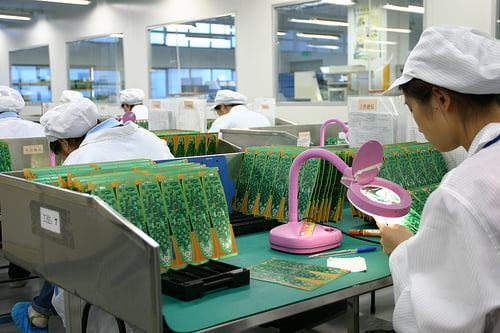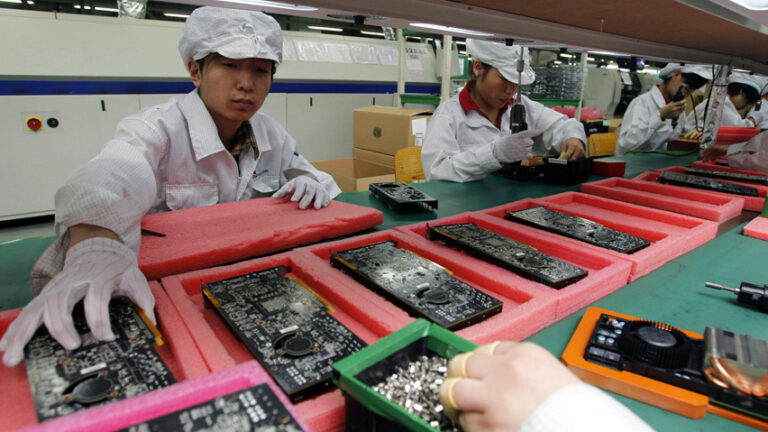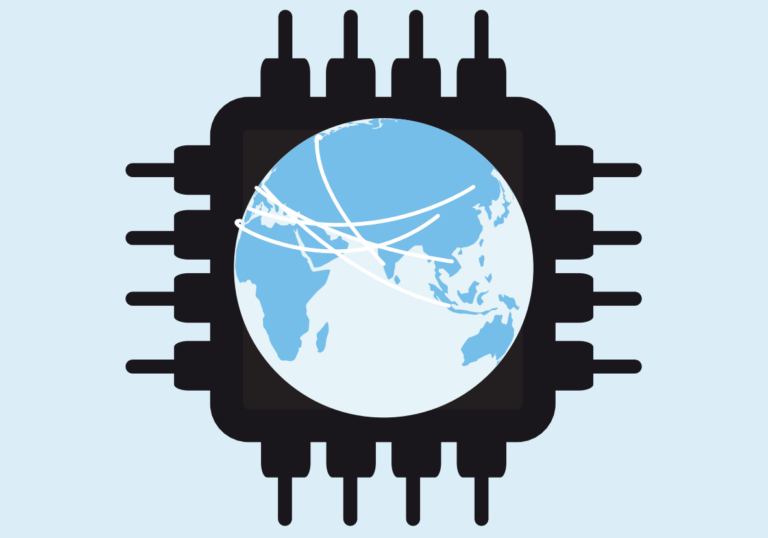
Opinion: Achieving fair electronics
During the recent Fairtrade week, the city of Amsterdam was awarded the title of “Fairtrade Capital” of the Netherlands. Amsterdam deserves the title in part because, over the past year, the city has structurally opted for Fairtrade purchasing practices. But that basically only covers food and flowers. Jenny Pannenbecker of SOMO wonders, what about the potential for municipalities to procure other goods and products in a more sustainable manner? For example, what about ICT hardware of which the city of Amsterdam is a major consumer? And, by next year, will we be able to announce that Amsterdam is also working hard toward a purchasing policy of fairly produced electronics?
This article has been published in Dutch on Vice Versa.nl(opens in new window) .
The big difference between Fairtrade and fairly produced ICT is, of course, that there’s no label for the latter. That makes it difficult for large consumers of laptops, computers, printers, monitors, smartphones and tablets to make decisions that favour better working conditions in the supply chain. Meanwhile, numerous governments and large-scale public buyers have carefully embarked on a “sustainable procurement” policy, which could potentially have positive effects on the working conditions of workers in the electronics sector. However, although this policy is absolutely essential, the transition process thus far has been too slow.
Terrible working conditions
Electronics firms that allow their merchandise to be produced in countries like China, Indonesia, Thailand, India and Mexico, are often associated with labour and human rights violations. Sometimes with terrible consequences, such as the wave of suicides in Chinese electronics factories a few years ago. Workers in the electronics sector work long hours for low pay. Discrimination and the exploitation of migrants and students in many producing countries are often the order of the day. Workers in this sector commonly operate without proper protection from hazardous substances such as benzene, which is associated with serious health risks. In South Korea, for example, dozens of cases of work-related leukaemia have been diagnosed among Samsung workers.
Trade unions and NGOs have already been fighting very hard for years to improve these unacceptable working conditions, but only with varying degrees of success. Despite the industry’s promises and efforts, little has changed. Companies often fail to properly identify the risks in their supply chains and thus fail to take appropriate measures to prevent violations. Governments have also fallen short in their compliance with labour laws.
Policy in the Netherlands?
Governments are attempting to establish frameworks that will lead to improvements in working conditions in both business supply chains and their own. In response, the Dutch government has drafted the mandatory International Social Conditions that apply to national government procurements and serves as a guide for local governments. Current efforts involve the review and further tightening of the regulations for sustainable procurement on both the national and European level.
Minister of Foreign Trade and Development Cooperation Lilliane Ploumen wants all companies that supply the government to live up to the United Nations’ Guiding Principles on Business and Human Rights (UNGP), which states that companies and buyers must be aware of what occurs along their entire supply chain, and should also make all efforts to avoid human rights violations. This means that, as these companies are forced to live up to these guidelines, a lot of work needs to still be done because companies and buyers currently often have no idea of what is happening in their supply chains.
Joining forces
But public sector buyers who want to do something for workers’ rights currently lack the political willpower to assert their influence on companies, major IT brands and manufacturers. This despite the fact that these buyers – especially those in the public domain – are often in a good position to pose tough questions about working conditions in the production phase and could require that their suppliers have a transparent supply chain.
The (semi-)public sector is a major consumer of electronics. Governments and universities are large-scale consumers of computers, laptops, mobile phones, printers and copiers. Together buyers in the public sector have significant purchasing power. If they were to join forces they could exert a crucial influence on the electronics sector that could in turn lead to structural improvements. But how do these public sector buyers find one another?
Electronics Watch
“Imagine the collective power of thousands of cities, universities and other groups cooperating”, Pauline Overeem, the Dutch coordinator of the European Network Electronics Watch (EW) ponders. What she is describing is the growing network of European public institutions that do “pioneering work” by promoting a new kind of public procurement policy that is both sustainable and socially responsible. The organisation, which was established by concerned NGOs and is funded by the European Union, has been active since the beginning of this year. The membership base of the EW continues to grow and now includes British universities in Edinburgh and Leeds as well as a number of university purchasing consortia. Overeem contends that “There is a clear need for a system that allows public institutions to exert real influence on current business practices and the living conditions of workers through their purchasing behaviour”.
But what kind of power do these procurement organisations actually have? How forceful are these (semi-)public institutions, what can they actually change and is there anything to really change if buyers are dependent on a handful of vendors and brands? Doesn’t it make more sense to simply enter into direct discussions with companies like Apple, Dell and Samsung?
These are the kind of legitimate and critical questions that Pauline Overeem hears in conversations with universities and municipalities in the Netherlands. “We are, of course, very familiar with the present relations between procurement organisations and their suppliers, which are often not the brands themselves, but intermediaries, a situation that ultimately limits the ability to make direct demands. Nevertheless, Electronics Watch is convinced that the pooling of procurement powers can indeed lead to change throughout the chain right onto the factory shop floor.”
EW offers governments and public institutions extra handholds in the application of the Social Conditions policy in the procurement of ICT hardware, which ensures independent workplace monitoring and lobbying efforts for structural improvements in factories and in the area of procurement practices. The organisation helps the procurement organisations involved by supplying product-specific social criteria and current information about factory conditions. “Many municipalities”, according to Overeem, “have ambitions in the area of sustainable procurement, which also includes ICT hardware. We can provide the concrete means to ensure that it does not end up as a non-issue.” Electronics Watch offers a unique, independent system for the monitoring and improvement of the human rights situation”, according to Overeem.
Ambitions involving the sustainable procurement of ICT all too often get stuck in the paperwork phase and are too often not linked to actual purchasing practices. But it doesn’t have to be this way. The title “Fairtrade Capital” is not the ultimate goal but actually just the beginning for Amsterdam – and all of the other Fairtrade municipalities in the Netherlands – in the stride for the sustainable sourcing of all purchases, from coffee to computers and from sugar to smartphones. Governments can join forces at the European level to work together on their purchasing policies and provide concrete improvements of the working conditions in the electronics sector.
Click here(opens in new window) for more information about Electronics Watch.
Partners
Related content
-

-
 Electronics Watch aims to improve labour conditions in the electronics-industryPosted in category:NewsPublished on:
Electronics Watch aims to improve labour conditions in the electronics-industryPosted in category:NewsPublished on: -
 Electronics Watch releases a detailed mapping report of the ICT industryPosted in category:NewsPublished on:
Electronics Watch releases a detailed mapping report of the ICT industryPosted in category:NewsPublished on: -
 Electronics Watch’s new investigative report shows major labour abuses in the ICT industryPosted in category:NewsPublished on:
Electronics Watch’s new investigative report shows major labour abuses in the ICT industryPosted in category:NewsPublished on: -

-
Workers’ rights in the global electronics sector Published on:
 Irene SchipperPosted in category:Publication
Irene SchipperPosted in category:Publication Irene Schipper
Irene Schipper

